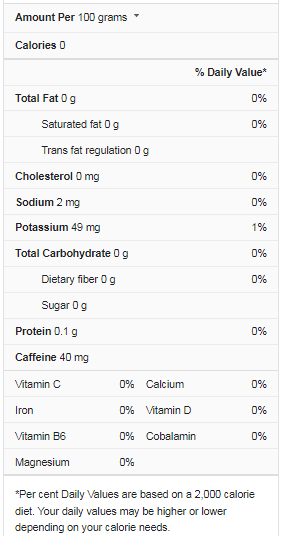Coffee may aid in weight loss and has been related to reducing body fat. According to one study, people who drink coffee are also more inclined to be physically active. Riboflavin (vitamin B2), niacin (vitamin B3), magnesium, potassium, and different phenolic compounds, or antioxidants, are among the nutrients found in coffee. According to some scientists, these and other compounds in coffee can help the human body in various ways. Experts estimate that 2.25 billion cups of coffee are consumed each day worldwide.
Coffee has been studied for its potential benefits in diabetes, cardiovascular disease, inflammatory bowel disease, and liver disease. Some, but not all, of these claims are supported by evidence. According to some research, coffee consumption may help prevent Alzheimer’s disease, Parkinson’s disease, and cognitive decline. Regular coffee drinking may be connected to a lower long-term risk of acquiring type 2 diabetes. Caffeine, a stimulant found in coffee, has been demonstrated to boost energy and reduce exhaustion by affecting the levels of particular neurotransmitters in the brain.
Is There Any Nutritional Value In Coffee?
When you think of coffee, the first thing that springs to mind is caffeine. However, according to Johns Hopkins University School of Medicine nutrition specialists, coffee includes antioxidants and other active compounds that may reduce internal inflammation and protect against disease. Antioxidants in black coffee can help combat cell damage and lower your chances of significant health problems like cancer and heart disease. In most American diets, coffee is the principal source of antioxidants.
Coffee Nutrition Facts
Coffee is a brewed beverage made from roasted coffee beans, the seeds of certain flowering plants in the Coffea genus, and the berries of certain flowering plants in the Coffea genus. To make a stable, the seeds of the coffee fruit are separated. The seeds are next roasted, transforming them into a usable product: roasted coffee, which is ground into small particles and steeped in hot water before being filtered out, resulting in a cup of coffee.
Coffee is a dark-colored, bitter, slightly acidic beverage that stimulates humans, owing to its caffeine content. It is one of the world’s most popular beverages and can be prepared and served in various ways (espresso, French press, caffè latte, or already-brewed canned coffee). Coffee is usually served hot, but cooled or iced coffee is also famous. Sugar, sugar, sugar substitutes, milk, or cream are frequently applied to mask the bitterness or increase the flavor. It goes well with coffee cake or a sweet dessert such as doughnuts.
Coffee Has A lot Of Health Benefits.
Protecting against type 2 diabetes, Parkinson’s disease, liver illness, and liver cancer are some of the potential health benefits of drinking coffee from Trusted Source. Coffee drinking may also be beneficial to one’s heart and circulatory system.
1. Coffee And Diabetes
Coffee may aid in the prevention of type 2 diabetes.
Researchers studied over 48,000 participants in 2014 and discovered that those who increased their coffee drinking by at least one cup per day for four years had an 11 percent lower risk of type 2 diabetes than those who did not. People who consumed four to six cups of caffeinated or decaffeinated coffee per day decreased the risk of metabolic syndrome, including type 2 diabetes.
2. Coffee And Parkinson’s Disease
In several studies, caffeine, which is found in coffee and many other beverages, has been linked to reducing the risk of Parkinson’s disease.
According to one study, men who drink more than four cups of coffee each day have a fivefold lower risk of Parkinson’s disease than men who do not. Even smokers have a lower risk of Parkinson’s disease when drinking coffee. This research team also discovered that coffee drinkers are less likely to suffer from depression and cognitive disorders like Alzheimer’s disease. However, insufficient data suggests that decaffeinated coffee can help prevent Parkinson’s disease. However, insufficient data suggests that decaffeinated coffee can help prevent Parkinson’s disease.
3. Coffee And Chronic liver Disease Or Cancer
Coffee use is thought to lower the risk of liver cancer. In 2015, a cohort study on a multiethnic population in the United States found that drinking two to three cups of coffee daily lowered the risk of getting hepatocellular carcinoma and chronic liver disease (CLD) by 38 percent and 46 percent, respectively, depending on the dose Trusted Source. Coffee appears to lower the risk of liver cancer, nonalcoholic fatty liver disease, and cirrhosis in people of all ages. These findings have now been supported by a 2021 studyTrusted Source, which suggests that drinking all forms of coffee may help protect against CLD.
4. Coffee And Other Liver Diseases
People who drink coffee may be less likely to develop gallstones. Coffee intake among persons with primary sclerosing cholangitis (PSC) and primary biliary cirrhosis was studied in 2014. (PBC). These are autoimmune diseases that damage the liver’s bile ducts. They discovered that those with PSC were more likely to drink less coffee than those without the illness. There was no evidence that coffee consumption differed between those with and without PBC. Another study from 2014 found a relationship between coffee drinking and a reduced risk of dying from nonviral hepatitis-related cirrhosis. Drinking two or more cups of coffee each day, according to the study, could cut the risk by 66 percent. The source you can trust.
5. Coffee And Heart Health
Caffeine consumption may have a minor beneficial effect on cardiovascular health, such as blood pressure. According to a 2018 study, drinking three to five cups of coffee each day can lower the risk of cardiovascular disease by 15%. Drinking one to five cups of coffee per day was also linked to a decreased overall mortality rate from any cause. People who have already had a heart attack do not appear to be at an increased risk of having another or dying as a result of it if they drink coffee. However, a 2017 meta-analysis discovered that persons who drink more coffee have higher blood lipids (fat) and cholesterol levels. These chemicals may put a person at risk for heart disease.
Negative Effects Of Coffee
Caffeine use has various advantages, but it can also have harmful side effects if consumed in excess. These are some of the possible adverse effects:
- gastrointestinal difficulties
- an elevated blood pressure
- Obstacles to conception Trusted
- harmful interactions with specific medications, such as psychiatric meds, thyroid medications, heartburn treatments, and antibiotics
- Women who take more than 300 milligrams (mg) of caffeine daily and do not consume adequate calcium may experience spinal bone loss.
- If a person drinks coffee while exercising, their risk of myocardial ischemia, a type of heart disease, increases.
- If a woman drinks a lot of coffee while pregnant, it can have detrimental consequences on the fetus, such as low birth weight.
- If a person drinks coffee while lactating, it might cause irritation and sleeplessness in nursing infants.
- However, this is not conclusive and may be limited. Excessive Caffeine Consumption A Trusted Source
- Symptoms of certain mental illnesses, such as schizophrenia or bipolar disorder, have gotten worse.
Is There Any Protein In Coffee?
Free and bound proteins make up around 10% to 13% of the dry matter in Arabica and robusta coffee. Proteins are made up of smaller components called amino acids, which can vary dramatically from one coffee to the next depending on various circumstances. No, coffee isn’t a high-protein beverage. On the other hand, protein level varies depending on the type of coffee. For instance, one cup (about six fluid ounces) of black coffee contains approximately 0.1 grams of protein, which is not meaningful.
Conclusion
“Unlike most other psychoactive drugs, caffeine is extensively used and is socially accepted. Caffeine is, in fact, the most widely utilized psychoactive chemical on the planet. “However, caffeine metabolism is slowed in newborns, pregnant women, and people who have liver illness. Furthermore, several drugs reduce caffeine metabolism, thus increasing the risk of caffeine intoxication. On the other hand, caffeine’s effects vary because we’re all diverse.



